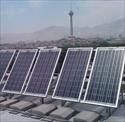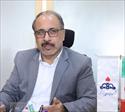Rooftop Solar Power Stations Installed for 22 Iranian Ministries, State Organizations

In line with President Masoud Pezeshkian’s directive for all government bodies to adopt solar energy, Iran has launched rooftop solar power plants for 22 ministries and state organizations, marking a significant step toward sustainable energy transition in the public sector.
According to the Vice-Presidency for Science, Technology, and Knowledge-Based Economy, the initiative was implemented using domestically produced solar panels developed by Iranian knowledge-based companies.
The project’s first phase focused on designing and standardizing rooftop solar systems for 22 ministries and public organizations, in accordance with a cabinet resolution mandating government institutions to utilize renewable energy sources.
In the second phase, the plan will be extended to critical infrastructure and major businesses that directly serve public needs, further integrating renewable energy into the country’s operational backbone.
Successful pilot installations on government buildings demonstrated the viability of this model, showing that rooftop solar systems can serve as an effective framework for achieving sustainable energy supply. Officials say the project could become a blueprint for broader adoption of clean energy solutions in residential buildings and everyday urban life. - Tehran Times
21/10/2025
Energy Management System to Be Implemented in Iran's Petchem Industry

Ali Rabani, director of energy consumption optimization at the National Petrochemical Company (NPC), announced plans to implement an energy management system across Iran’s petrochemical industry. He urged holding companies and petrochemical firms to make full use of available resources for the system’s deployment.
According to the NPC, Rabani said changing consumption habits requires time and greater public awareness. He expressed hope that this year, the families of petrochemical industry employees will play a more active role in the “10 Percent Energy Reduction” campaign.
Highlighting the direct link between energy optimization and carbon emission reduction, Rabani stressed the importance of integrating carbon certification into efficiency projects.
He described the full implementation of an energy management system and conducting detailed energy audits every three years as essential requirements. Rabani called for continued focus on executing improvement projects effectively and maintaining the results achieved.
Referring to NPC’s plan to establish the energy management platform, Rabani thanked managing directors, board members, energy managers, and staff of petrochemical companies for their special attention to optimization initiatives. He also emphasized the importance of enhancing public awareness about energy conservation. - Shana
21/10/2025
Russia Ready to Expand Cooperation with Iran in All Areas: Kremlin

Kremlin spokesman Dmitry Peskov said on Monday that Russia is ready to expand cooperation with Iran in all areas, and the current relations are developing dynamically.
Russia supports negotiations on the Joint Comprehensive Plan of Action (JCPOA), and Europe's unconstructive position complicates the situation, Kremlin spokesman Dmitry Peskov said on Monday.
"The unconstructive position of the Europeans, of course, leads to the fact that it is becoming even more difficult day by day. We believe that it is necessary to negotiate. Of course, there are no grounds for exerting excessive pressure on Iran, a sovereign country, in this way," Peskov said, answering the question whether the West's position would cause a new escalation towards Iran.
Russia is ready to expand cooperation with Iran in all areas, and the current relations are developing dynamically, Peskov added. - Mehr
21/10/2025
DHL Global Forwarding Launches Regional Facility at Qatar Free Zones

Qatar Free Zones Authority (QFZ) and DHL Global Forwarding, the global freight forwarding arm of DHL Group, have officially inaugurated the group’s new logistics facility at Ras Bufontas Free Zone.
The inauguration ceremony was held in the presence Sheikh Faisal bin Qassim Al Thani, Chairman of Al Faisal Holding - Shareholder of DHL Global Forwarding Qatar & Chairman of the Qatari Businessmen Association, Sheikh Mohammed Bin Hamad bin Faisal Al-Thani, CEO of QFZ, and Samer Kaissi, CEO – GCC Cluster, DHL Global Forwarding.
The new DHL Global Forwarding facility spans more than 1,200 square meters and will serve as a regional distribution warehouse specializing in air freight consolidation services, supporting both regional and global distribution networks.
Sheikh Mohammed bin Hamad bin Faisal Al-Thani, CEO of QFZ stated: “The inauguration of DHL Global Forwarding in Ras Bufontas Free Zone reflects a strategic step to reinforce Qatar’s stature as a high-value logistics hub, reducing time to markets and enhancing the supply chain flexibility across the region. As a global logistics leader, DHL will improve the operational capacity, enhance specialized warehousing capabilities, and reinforce multimodal connectivity, benefitting from the proximity to Hamad International Airport, and creating an attractive footprint for partners and suppliers across various economic sectors. This investment will also drive our transition from a transit hub to an integrated solutions platform supported by a flexible regulatory framework and advanced digital infrastructure, ensuring new growth prospects and connecting the region to markets in Africa and Asia.”
Samer Kaissi, CEO – GCC Cluster, DHL Global Forwarding, said: “Qatar plays a key role in our regional logistics strategy, particularly as we expand our multimodal capabilities across the GCC. Hamad Port has long been a vital part of our network, supporting east-west trade flows.
He further added, "With our new facility in Ras Bufontas Free Zone, located close to the airport, we are enhancing our airfreight capabilities, which enables us to deliver even more resilient and scalable logistics solutions, especially for the growing GCC-Africa corridors."
21/10/2025
Rise in Oman's Refinery Production

Oman's refinery sector recorded a 6.2 per cent increase in total production through August 2025, according to preliminary data from the National Centre for Statistics and Information (NCSI).
This overall growth occurred alongside a 6.8 per cent month-over-month decline in motor fuel production compared to July 2025 figures, reported ONA.
The petroleum products market displayed varied performance across different categories.
Regular gasoline (91 octane) production reached 11.36 million barrels, representing a 12 per cent year-over-year increase, while premium gasoline (95 octane) output grew 11.7 per cent to 9.17 million barrels.
Domestic sales for both gasoline grades showed modest growth of 1.8 per cent and 1.3 per cent respectively, though regular gasoline exports declined 24.3 per cent against a substantial 77.4 per cent increase for premium gasoline exports.
Gas oil production expanded 7.3 per cent to 22.44 million barrels with domestic consumption rising 6 per cent, while exports saw a marginal 1 percent contraction.
The aviation fuel segment experienced production and sales declines of 10.9 percent and 4.6 per cent respectively, with exports falling 17.7 per cent.
Liquefied Petroleum Gas (LPG) production increased 7.3 per cent to 5.12 million barrels, accompanied by a notable 21.7 per cent surge in domestic sales, though exports decreased by 53 per cent.
The petrochemical sector demonstrated particularly strong performance, with polypropylene production surging 82.7 per cent to 237,700 metric tonnes despite an 11.3 per cent decline in domestic sales.
Benzene and paraxylene production increased by 6.4 per cent and 8.3 per cent respectively.
Export markets showed robust growth across all major petrochemical products, with polypropylene exports climbing 69.6 per cent, paraxylene exports rising 16.6 per cent, and benzene exports growing 6.1 per cent through August 2025 compared to the same period last year.
21/10/2025
Saudi Mineral Exploration Spending at Double Vision 2030 Goal

Saudi Arabia’s mineral exploration spending has jumped to SR487 (US$129.85) per sq. km, more than double its Vision 2030 target of SR200 (US$53.33), signaling the Kingdom’s push to become a global mining hub, a senior official said.
In an interview with Saudi newspaper Al-Eqtisadiah, Abdullah Al-Shamrani, CEO of the Saudi Geological Survey, said the Kingdom’s mineral exploration expenditure index has risen 600 percent over the past seven years.
He attributed the jump to an accelerated geological survey and exploration program in the Arabian Shield, supported by government funding and matched by private sector investment.
“In 2018, the exploration spending index in Saudi Arabia was about SR80 (US$21.33) per sq. km, while the Vision’s target was to raise the index to SR200 per sq. km,” Al-Shamrani told Al-Eqtisadiah.
Spending reached SR226 (US$60.26) per sq. km in 2023, already surpassing the Vision 2030 goal, before climbing to the current SR487.
Al-Shamrani added that the Kingdom’s mineral discoveries are delivering tangible results, with the estimated value of discovered mineral wealth reaching US$2.5 trillion by the end of 2024 — double the 2017 estimates.
To boost investment, Saudi Arabia plans to launch quarterly mineral data packages, designed to update the national geological database and provide investors with the latest mining information.
“This unprecedented investment has enabled us to carry out our missions with remarkable success,” Al-Shamrani said, pointing to the expansion of exploration programs and advances in digital transformation.
As a result of this digital push, the Kingdom has released major new data packages, including surface geochemical survey data and aerial magnetic geophysical survey data, covering the Arabian Shield in a detailed 1:100000 scale.
By providing this pre-competitive exploratory data, the SGS aims to lower entry barriers and give investors the clarity needed to operate with confidence.
Saudi Arabia has also climbed global rankings for geological data, rising from 108th place in 2017 to 23rd currently. Al-Shamrani attributed the improvement to unified regulations, better investment laws, and proactive provision of geological information to investors.
The primary focus of the exploration campaign is the Arabian Shield, an ancient geological formation rich in minerals like gold, copper, zinc, and iron that covers roughly a third of the Kingdom’s land area.
Al-Shamrani detailed the extensive work undertaken, stating that nearly 88,000 field survey samples have been collected from valleys across the Shield. Furthermore, a comprehensive aerial survey of the entire region is 93 percent complete and analyzed.
Speaking at the first GEOMIN forum, which attracted experts from over 30 countries, Al-Shamrani connected these national efforts to a global context. He emphasized that the worldwide drive toward decarbonization and the rising demand for critical minerals present a significant challenge.
The top official noted that it is essential for experts to innovate and transcend traditional methods to accelerate the discovery and supply of these essential resources to meet the needs of humanity.
21/10/2025
ICRC Confirms Expansion of Humanitarian Operations Across Yemen

The International Committee of the Red Cross (ICRC) has officially announced the expansion of its humanitarian interventions in Yemen, reaffirming its long-standing commitment to support communities affected by conflict, economic collapse, and deteriorating public services.
In a recent statement, the ICRC emphasized that its operations will intensify across multiple governorates, focusing on critical sectors such as health care, water and sanitation, economic security, and the protection of civilians.
The organization has maintained a continuous presence in Yemen since 1962 and works in close coordination with the Yemen Red Crescent Society (YRCS), its primary local partner.
“Years of armed conflict and economic hardship have exhausted people’s capacity to cope,” the ICRC noted, citing that over 70% of Yemen’s population now depends on humanitarian aid to survive, while more than 80% live below the poverty line.
The expanded interventions will include:
- Support for hospitals and health centers, including surgical supplies, equipment, and staff training.
- Rehabilitation of water infrastructure to ensure access to clean drinking water in urban and rural areas.
- Livelihood programs aimed at helping families become financially independent through vocational training and micro-grants.
- Protection services, including assistance to detainees and efforts to reconnect separated families.
- Mine clearance and risk education, especially in areas contaminated by explosive remnants of war.
The ICRC also reiterated its neutral and impartial stance, stressing that its humanitarian work is guided solely by the needs of affected populations, regardless of political or military affiliations.
It continues to engage constructively with both state and non-state actors to facilitate safe access to vulnerable communities.
This expansion comes at a time when Yemen’s humanitarian crisis remains one of the world’s most severe, with millions facing food insecurity, displacement, and limited access to essential services.
The ICRC’s renewed commitment signals a vital lifeline for many and underscores the importance of sustained international support.
21/10/2025